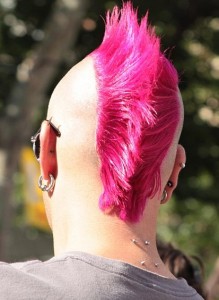 Laws restricting tattooing and body modification are in the works in at least three states. Arkansas would ban dermal implants, a procedure where jewelry is implanted under the skin, and update its procedures for licensure of artists and tattooing of minors, including increased penalties and fines. West Virginia would likewise ban tattooing for minors under 16 and specify parental consent procedures for 17- and 18-year-olds, including written consent at the time of tattooing. The Utah legislature has passed a similar bill updating its consent requirements for minors. Meanwhile, a Texas father was reportedly arrested for felony injury to a child and felony aggravated assault for allowing his teenaged daughters to be tattooed.
Laws restricting tattooing and body modification are in the works in at least three states. Arkansas would ban dermal implants, a procedure where jewelry is implanted under the skin, and update its procedures for licensure of artists and tattooing of minors, including increased penalties and fines. West Virginia would likewise ban tattooing for minors under 16 and specify parental consent procedures for 17- and 18-year-olds, including written consent at the time of tattooing. The Utah legislature has passed a similar bill updating its consent requirements for minors. Meanwhile, a Texas father was reportedly arrested for felony injury to a child and felony aggravated assault for allowing his teenaged daughters to be tattooed.
Certainly, tattoos are an increasingly accepted and widespread form of self-expression. In holding unconstitutional a municipality’s ban on tattoo parlors, in 2010 the Ninth Circuit Court of Appeals in Anderson v. City of Hermosa Beach held that tattoos were expressive activity and thus protected by the First Amendment. Applying a strict scrutiny standard, the court concluded that the total ban on tattoo parlors was unconstitutional. Interestingly, the court found that the expression was not merely the words or images, but the “tattoo itself, the process of tattooing, and the business of tattooing.”
But whether all courts would accept this rationale, or extend it to other practices such as dermal implants and scarification is uncertain. Moreover, given children’s lesser constitutional rights, the government’s ability to regulate tattoos on minors – – – with or without parental permission – – – is also uncertain. Yet the arrest of a father for allowing teenagers to have “body art” is sure to raise a variety of constitutional questions, not to mention policy ones.
[image via]
